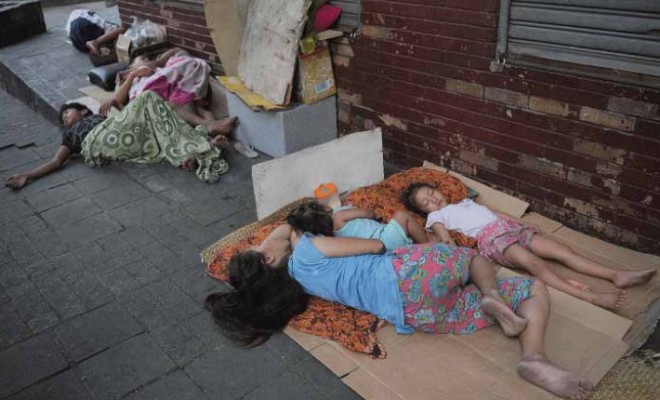Dinky Soliman: We don’t hide kids, poor people

FORBIDDEN SIGHT This picture taken on Tuesday shows homeless people sleeping on a sidewalk in Manila. The government has swept 20,000 homeless people from the city’s streets as part of the cleanup for the Asia-Pacific Economic Cooperation (Apec) Summit next week. AFP
NAGA CITY—“We don’t hide children and we don’t hide poor people.”
So stressed Social Welfare Secretary Dinky Soliman following reports that homeless people were being taken off the streets of Metro Manila as part of preparations for the Asia-Pacific Economic Cooperation (Apec) summit next week.
In January this year, in time for Pope Francis’ visit to the country, Soliman similarly came under fire when some 100 homeless families were brought to a plush resort in Batangas province, ostensibly for a seminar. The activity was not meant to hide street dwellers, Soliman said then.
Soliman, who visited this city on Tuesday, said the homeless people were among more than 4,000 families in the National Capital Region who were listed in the government’s modified conditional cash transfer (MCCT) program that the Department of Social Welfare and Development (DSWD) had been implementing for the last two years.
“We don’t do (the eviction) because of Apec,” she said, adding that homeless families identified as MCCT beneficiaries are allowed to rent a place to stay, with the DSWD giving the rent directly to the lessor or owner of the rented space.
The DSWD shoulders the rent until the beneficiaries find a source of income and are able to pay it themselves, she said.
Orientation seminars
Soliman corrected an earlier statement by Manila Auxiliary Bishop Broderick Pabillo who said that homeless people were given P3,000 to P4,000 each for them to leave the streets of Manila because of the Apec meeting.

Soliman said 35 of the families taken off the streets in January had been living in rented houses, 12 had returned to their provinces of origin, while 13 had gone back to their houses in resettlement sites.
They were given livelihood, one of the benefits of being in the MCCT program, she said.
Of the more than 4,000 homeless families registered in the MCCT, Soliman said over 3,000 already live in rented houses, with 700 of them paying on their own.
Those who chose to remain on the streets earn their keep by vending cigarettes to commuters, she added.
Soliman said the MCCT program would be enhanced in Manila after an agreement forged recently between the DSWD and Mayor Joseph Estrada, for the joint launch of a livelihood program for street dwellers along the stretch of Taft Avenue and T. M. Kalaw Street.